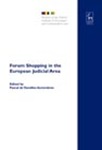Party Autonomy and Beyond: An International Perspective of Contractual Choice of Law
Mo Zhang (Temple University) has posted “Party Autonomy and Beyond: An International Perspective of Contractual Choice of Law” on SSRN; it originally appeared in the Emory International Law Review, Vol. 20, No. 511, 2006. The abstract reads:
As a popular choice of law doctrine, party autonomy allows the parties in international contracts (or foreign contracts) to choose governing law of particular jurisdiction they prefer. Premised on freedom of contract, this doctrine has evolved in many ways since it was introduced in the 1600’s and has become an internationally accepted principle governing choice of law in contracts. In international community, the doctrine of party autonomy has been adopted and applied through the rule-based framework or mechanism. But the acceptance of party autonomy in the United States is intertwined with interest or policy analysis so closely that it is often quite difficult for the parties to predict the ultimate outcome of the choice of law they have made. In addition, the interest and policy analysis based American choice of law approaches and the choice of law rules so developed in the US hardly have any general application internationally. Also, the connection requirement has rendered the US contractual choice of law in discordance with international common practice. In fact, both interest analysis and connection requirement are not necessarily needed with regard to the choice of law by the parties. Choice of law should be ruled based and the rules should be intended to maximize the individual or private welfare rather than the state interest.



 A new addition to the Hart Publishing private international law catalogue for 2008 is
A new addition to the Hart Publishing private international law catalogue for 2008 is